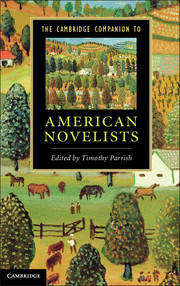Book contents
- Frontmatter
- Contents
- Contributors
- Introduction
- 1 James Fenimore Cooper
- 2 Nathaniel Hawthorne
- 3 Herman Melville
- 4 Harriet Beecher Stowe
- 5 Mark Twain
- 6 Henry James
- 7 Edith Wharton
- 8 Theodore Dreiser
- 9 Willa Cather
- 10 F. Scott Fitzgerald
- 11 Ernest Hemingway
- 12 William Faulkner
- 13 Henry Roth
- 14 Djuna Barnes
- 15 Zora Neale Hurston
- 16 Richard Wright
- 17 Raymond Chandler
- 18 Ralph Ellison
- 19 J. D. Salinger
- 20 Patricia Highsmith
- 21 Vladimir Nabokov
- 22 Jack Kerouac
- 23 Saul Bellow
- 24 Kurt Vonnegut
- 25 John Updike
- 26 Thomas Pynchon
- 27 Toni Morrison
- 28 Philip Roth
- 29 Don DeLillo
- 30 Cormac McCarthy
- Guide to Further Reading
- Index
- References
16 - Richard Wright
Published online by Cambridge University Press: 05 December 2012
- Frontmatter
- Contents
- Contributors
- Introduction
- 1 James Fenimore Cooper
- 2 Nathaniel Hawthorne
- 3 Herman Melville
- 4 Harriet Beecher Stowe
- 5 Mark Twain
- 6 Henry James
- 7 Edith Wharton
- 8 Theodore Dreiser
- 9 Willa Cather
- 10 F. Scott Fitzgerald
- 11 Ernest Hemingway
- 12 William Faulkner
- 13 Henry Roth
- 14 Djuna Barnes
- 15 Zora Neale Hurston
- 16 Richard Wright
- 17 Raymond Chandler
- 18 Ralph Ellison
- 19 J. D. Salinger
- 20 Patricia Highsmith
- 21 Vladimir Nabokov
- 22 Jack Kerouac
- 23 Saul Bellow
- 24 Kurt Vonnegut
- 25 John Updike
- 26 Thomas Pynchon
- 27 Toni Morrison
- 28 Philip Roth
- 29 Don DeLillo
- 30 Cormac McCarthy
- Guide to Further Reading
- Index
- References
Summary
The argument for Richard Wright (1908–60) as one of the most influential American novelists of the twentieth century rests on his essayistic and naturalistic novel Native Son (1940) and his fictionalized autobiography, Black Boy (1945). Wright’s trademarks as an urban naturalist and modernist tracing chronic hunger, racial conflict, social disempowerment, family dysfunction, and educational disadvantage pervade these two works. His quest throughout is to understand “the framework of contemporary living … for theories to light up the shadows of conduct.” Charting a new and disturbing trajectory of race relations in America, Wright created both an autobiographical self and a male African-American subjectivity in Black Boy and Native Son. These works provide for the first time in American fiction, as Sterling Brown argues in his 1940 review of Native Son, a racially based “psychological probing of the consciousness of the outcast, the disinherited, the generation lost in the slum jungles of American civilization.” Black Boy and Native Son would establish the form for Wright’s most effective kind of writing – autobiographical prose – that would not only underlie his most successful literary productions but dominate his later travel writings and literary journalism: the observer-participant Black Power (1954), The Color Curtain (1956), White Man Listen! (1957), and Pagan Spain (1957). All are written in this particular prose, which would confirm Wright’s status as an enduring talent and “global man of letters.”
- Type
- Chapter
- Information
- The Cambridge Companion to American Novelists , pp. 156 - 167Publisher: Cambridge University PressPrint publication year: 2012
References
- 1
- Cited by

